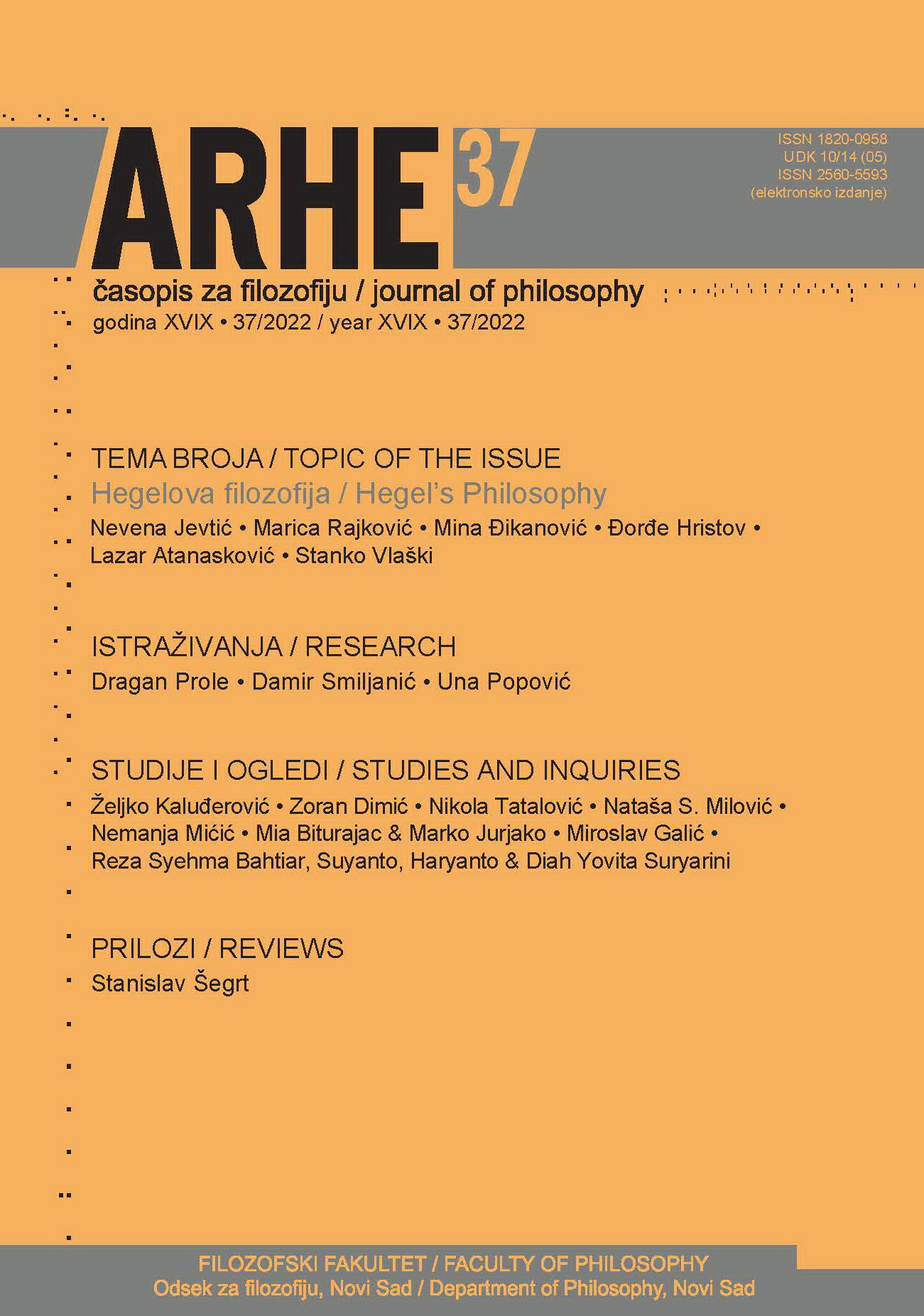KO JE ZAPRAVO VARVAROGENIJE?
Glavni sadržaj članka
Apstrakt
Članak ispituje umetničku pojavu Ljubomira Micića, profesora filozofije koji neobično rano napušta naučnu oblast za koju se školovao i odbacuje državnu službu. Micićev pojam varvarogenija protumačen je posredstvom konstitutivne neravnoteže između nacionalnog i internacionalnog. Opštost i nadnacionalni karakter Novog Čoveka najčešće nisu uspevali da amortizuju nacionalnu posebnost, a još manje da ponude rešenje za sve nacionalne teškoće i izazove. Nasuprot uobičajenim tumačenjima, autor argumentuje u prilog teze da Micićev koncept varvarogenija nema nikakve nacionalne kulturne osobenosti. Samim tim kod njega nema ničega specifično srpskog, nacionalnog, što bi se moglo ponuditi na međunarodnom planu, razmeniti ili učiniti internacionalnim. Razlozi se pronalaze komparativnim čitanjem nekih ideja romantizma u odnosu na rane avangarde. Figure koje Micić izričito koristi: heroizam duha, dobrota srca, čistota duše, neposredna ljudskost, odviše su formalne i opšte, više na nivou ideala i programa nego iskustva i stvarnosti. Napokon, svaka nacija bi ih mogla sebi pripisivati. Sve kulture s posebnom pažnjom neguju primere dobrote, požrtvovanosti, izvanrednih gestova ljudskosti. Varvarogenije je otuda i svačiji i ničiji.
Detalji članka

Ovaj rad je pod Creative Commons Autorstvo-Bez prerada 4.0 Internacionalna licenca.
Reference
Aleksić, Dragan (1921) „Dadaizam“, Zenit 1921/3, Zagreb.
Aleksić, Dragan (1978) Dada tank, Nolit, Beograd, prir. G. Tešić.
Ball, Hugo (1927) Die Flucht aus der Zeit, DunckerHumblot, München/Leipzig.
Blanchot, Maurice (1969) „L’ Atheneum“, L’Entretien infini, Gallimard, Paris.
Fuhrmann, Manfred (2000) Der europäische Bildungskanon des bürgerlichen Zeitalters, Insel Verlag, Frankfurt am/Main/Leipzig.
Goldsworthy, Vesna (1998) Inventing Ruritania. The Imperialism of the Imagination, Yale University Press, New Haven/London.
Golubić, Vidosava/Subotić, Irina (2008) Zenit 1921-26, NBS/Institut za književnost i umetnosti/SKD Prosvijeta, Zagreb/Beograd.
Grdan, Lada (2010) Zenit i simultanizam, Službeni glasnik, Beograd.
Ilić, Saša (2021) „Ljubav i smrt posle avangarde“, Anuška Micić/Ljubomir Micić, Strašna komedija. Prepiska 1920-1960. Narodna biblioteka Srbije, Beograd, prir. S. Ilić/D. Peruničić.
Konstantinović, Radomir (1969) „Ko je barbarogenije“, Treći program, proleće, Beograd.
Kriener, Thurit/Rovagnoti, Gabriella (2005) Dionysische Perspektiven. Gerhart Hauptmanns Novelle „Der Ketzer von Soana“ und sein Brifwechsel mit Rudolf Panwitz, Erich Schmidt, Berlin.
Marc, Franz (2011) „Die Wilden Deutschlands“ (1912), Der Blaue Reiter. Eine Geschichte in Dokumenten, Reclam, Stuttgart, Hg. A. Hüncke.
Marinetti, Filippo Tommaso (1980) Le futurisme, L’Aged’Homme, Milano/Lausanne.
Markuš, Zoran (2003) Zenitizam, Signature, Beograd 2003.
Micić, Ljubomir/Goll, Ivan/Tokin, Boško (1921) Manifest zenitizma, Biblioteka Zenit, Zagreb.
Micić, Ljubomir (1921) „Duh zenitizma“, Zenit, Zagreb 1921/7.
Micić, Ljubomir (1921) „Čovek + život“, Zenit, Zagreb, 1921/10.
Micić, Ljubomir (1991) Zenitizam, Dom/Narodni muzej, Beograd.
Micić, Ljubomir (1993) Barbarogenije decivilizator, Filip Višnjić, Beograd, prev. R. Jovanović.
Micić, Anuška/Micić, Ljubomir (2021) Strašna komedija. Prepiska 1920-1960, Narodna biblioteka Srbije, Beograd, prir. S. Ilić/D. Peruničić.
Mondrian, Piet (1987) „Neo Plasticism“ (1923), The New Art – the New Life, The Collected Wrtitings, Thames and Hudson, London, ed. and trans. by H. Holtzman/M. S. James.
Niče, Fridrih (2008) Pisma majci. Izbor iz perioda 1850-1888, Filip Višnjić, Beograd, prev. J. Burojević.
Prole, Dragan (2018) Jednakost nejednakog. Fenomenologija i rane avangarde, IKZS, Sremski Karlovci/Novi Sad.
Schlegel, Friedrich (1980) Literarische Notizen 1797-1801, Ullstein Materialien, Frankfurt am/Main/Berlin.
Subotić, Irina (2000) Od avangarde do Arkadije, CLIO, Beograd.
Tešić, Gojko(2009) Srpska književna avangarda (1902-1934), Službeni glasnik, Beograd.
Tokin, Boško (1921) Manifest zenitizma, Biblioteka Zenit, Zagreb.
Wienand, Kea (2015) Nach dem Primitivismus? Künstlerische Verhandlungen kultureller Differenz in der Bundesrepublik Deutschland 1960-1990, Transcript, Bielefeld.
